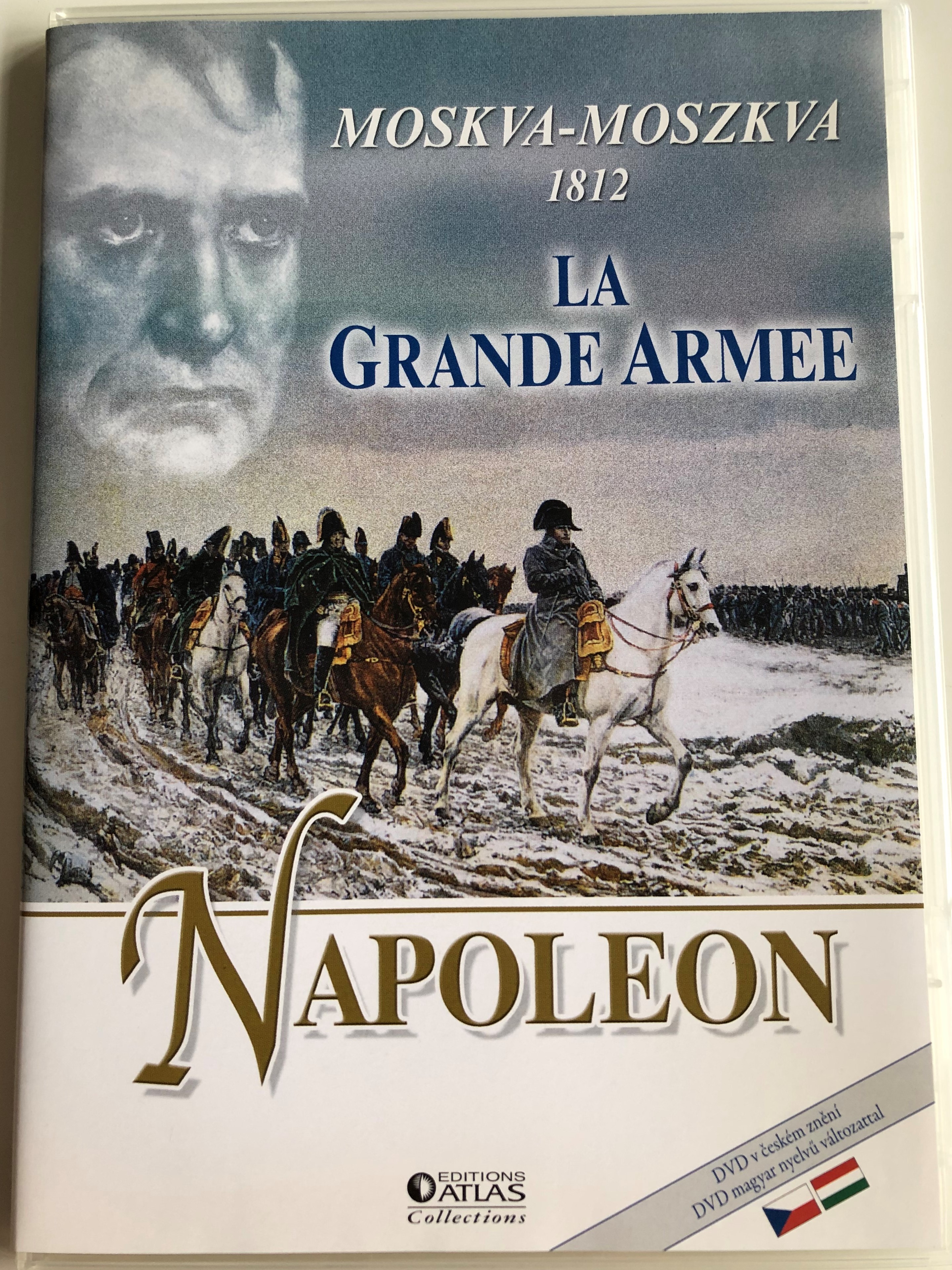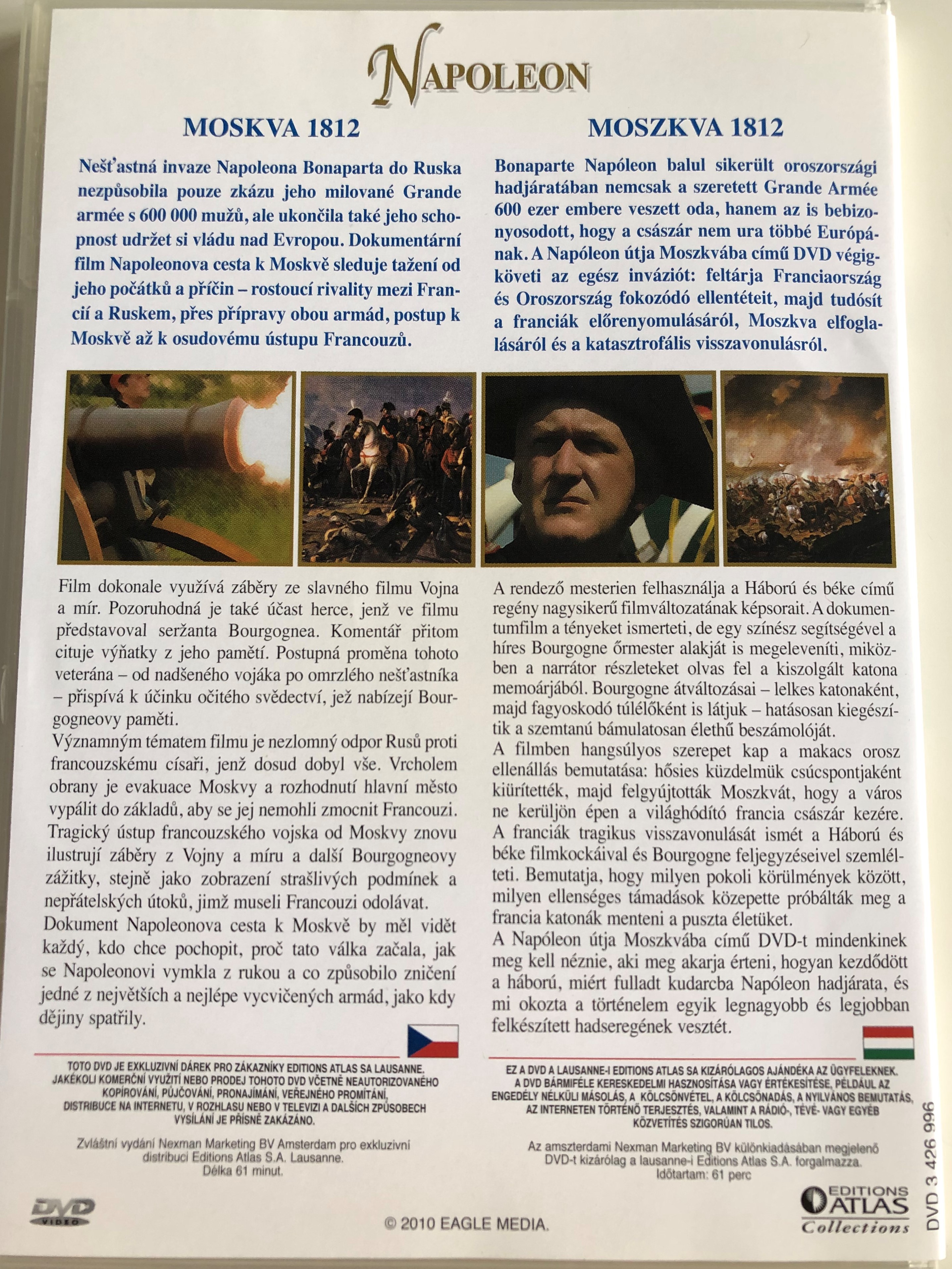Description
Napoleon - La Grande Armee DVD 2010 Moskva 1812 - Napoleon - Moszkva 1812 / Napoleon útja Moszkvába / Napoleon's Great Army / The Battle for Moscow Documentary
REGION 2 PAL DVD
UPC 5996473009013
MADE IN Netherlands
AUDIO: Czech 2.0, Hungarian 2.0
Total Runtime: 61 minutes
Hungarian Summary:
Bonaparte Napóleon balul sikerült oroszországi hadjáratában nemcsak a szeretett Grande Ármée 600 ezer embere veszett oda, hanem az is bebizonyosodott, hogy a császár nem ura többé Európának. A Napóleon útja Moszkvába című DVD végig.
követi az egész inváziót: feltárja Franciaország és Oroszország fokozódó ellentéteit, majd tudósít a franciák előrenyomulásáról, Moszkva elfoglalásáról és a katasztrofális visszavonulásról.
A rendező mesterien felhasználja a Háború és béke című regény nagysikerű filmváltozatának képsorait. A dokumentumfilm a tényeket ismerteti , de egy színész segítségével a híres Bourgogne őrmester alakját 15 megeleveníti, miközben a narrátor részleteket olvas fel a kiszolgált katona memoárjából. Bourgogne átváltozásai — lelkes katonaként, majd fagyoskodó túlélőként is látjuk — hatásosan kiegészítik a szemtanú bámulatosan élethű beszámolóját.
A filmben hangsúlyos szerepet kap a makacs orosz ellenállás bemutatása: hősies küzdelmük csúcspontjaként kiürítették, majd felgyújtották Moszkvát, hogy a város
ne kerüljön épen a világhódító francia császár kezére. A franciák tragikus visszavonulását ismét a Háború és béke filmkockáival és Bourgogne feljegyzéseivel szemlélteti. Bemutatja, hogy milyen pokoli körülmények között, milyen ellenséges támadások közepette próbálták meg a francia katonák menteni a puszta életüket.
A Napóleon útja Moszkvába című DVD-t mindenkinek meg kell néznie, aki meg akarja érteni, hogyan kezdődött a háború, miért fulladt kudarcba Napóleon hadjárata, és mi okozta a történelem egyik legnagyobb és legjobban felkészített hadseregének vesztét.
English Summary:
Not only did the beloved Grande Armee lose his 600,000 men in the failed campaign of the Bonaparte Napoleon in Russia, but it also proved that the emperor was no longer the master of Europe. The DVD of Napoleon's journey to Moscow that follows the whole invasion: it uncovers the growing contradictions between France and Russia, and then reports on the French advance, the occupation of Moscow, and the catastrophic retreat.
The French invasion of Russia, known in Russia as the Patriotic War of 1812 (Russian: Отечественная война 1812 года, romanized: Otečestvennaja vojna 1812 goda) and in France as the Russian campaign (French: Campagne de Russie), began on 24 June 1812 when Napoleon's Grande Armée crossed the Neman River in an attempt to engage and defeat the Russian Army. Napoleon hoped to compel the Emperor of All Russia, Alexander I, to cease trading with British merchants through proxies in an effort to pressure the United Kingdom to sue for peace.[16] The official political aim of the campaign was to liberate Poland from the threat of Russia. Napoleon named the campaign the Second Polish War to gain favor with the Poles and to provide a political pretext for his actions.[17]
At the start of the invasion, the Grande Armée numbered around 685,000 soldiers (including 400,000 soldiers from France). It was the largest army ever known to have been assembled in the history of warfare up to that point. Through a series of long marches Napoleon pushed his army rapidly through Western Russia in an attempt to destroy the Russian Army, winning a number of minor engagements and a major battle, the Battle of Smolensk in August. Napoleon hoped this battle would win the war for him, but the Russian Army slipped away and continued to retreat, leaving Smolensk to burn.As their army fell back, the Russians employed scorched-earth tactics, destroying villages, towns and crops and forcing the invaders to rely on a supply system that was incapable of feeding their large army in the field. On 7 September the French caught up with the Russian Army, which had dug itself in on hillsides before the small town of Borodino, seventy miles west of Moscow. The following Battle of Borodino, the bloodiest single-day action of the Napoleonic Wars, with 72,000 casualties, resulted in a narrow French victory. The Russian Army withdrew the following day, leaving the French again without the decisive victory Napoleon sought. A week later, Napoleon entered Moscow, only to find it abandoned and burned by the Russians.
















